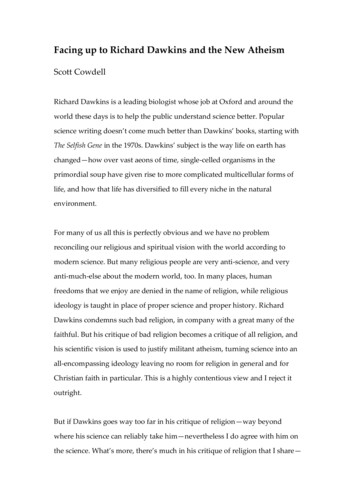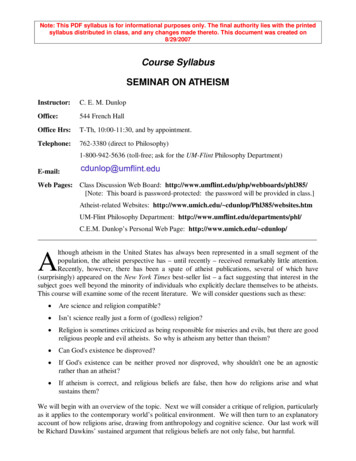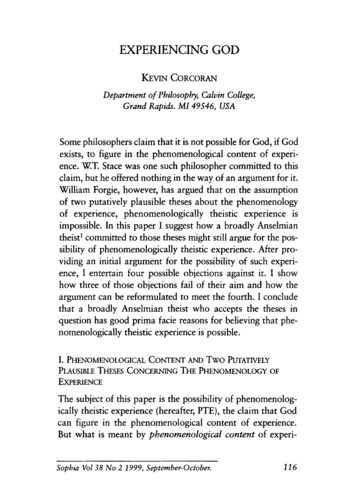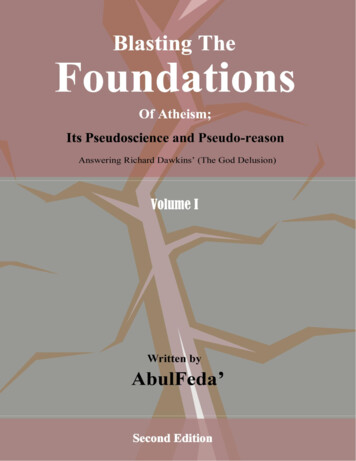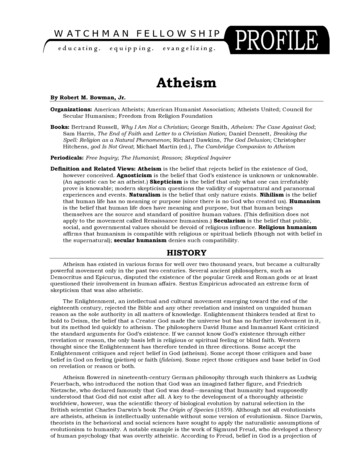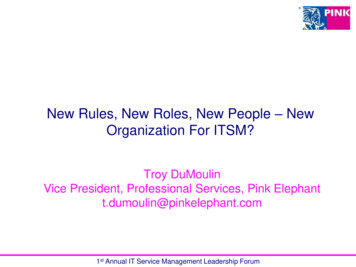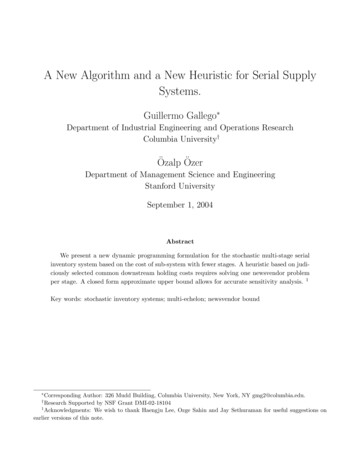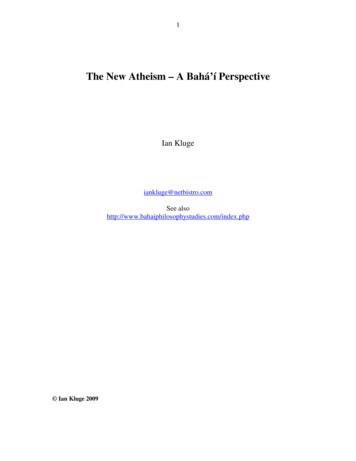
Transcription
1The New Atheism – A Bahá’í PerspectiveIan Klugeiankluge@netbistro.comSee p Ian Kluge 2009
2IntroductionSince the publication of Sam Harris’ The End of Faith in 2004, a number of books extollingthe virtues of atheism have gained prominence in North America, notably Christopher Hitchens’ godIs Not Great, Richard Dawkins’ The God Delusion, and Daniel Dennett’s Breaking the Spell. Otherbooks have also appeared but none achieved the fame and/or notoriety of these four. These textsadopted a pugnacious and even contemptuous tone towards religion and theists of all kinds, even themildest of them, Dennett’s Breaking the Spell, suggesting that atheists ought to rename themselves“brights” – which suggests that theists are obviously less ‘bright.’ According to the ‘new atheists’ asthey were called, the only truth-claims we can accept are those meeting the standards of modernscience. They completely rejected the existence of the super-natural or super-sensible aspects ofreality. In addition, they attempt to dismantle various philosophical proofs of God, develop theoriesabout the pathological origin of religion, detail crimes committed by religion and challenge the linkbetween religion and morality.This paper is a response to the philosophical claims of the new atheists, i.e. an analysis of thephilosophical foundations of their beliefs both from a logical point of view, and from the perspectiveof the Bahá’í Writings. Logically and philosophically speaking, their works are deeply flawed, and, asis to be expected, they are often in disagreement with the Bahá’í Writings – though on a number ofissues they are in agreement with them. This paper shall focus only on the major issues and shall notpoint out every error of fact, every identifiable logical error (and there are plenty)1 or the variouspolemical and rhetorical theatrics they perform to advance their case.Not unexpectedly, the number of differences between the new atheists and the Bahá’íWritings far exceeds the number of agreements or convergences. Writers calling for the wholesaleabolition of religion and all concepts of the super-natural or super-sensible, are not likely to havemuch in common with the scriptures of any religion, even one that accepts evolution, rationalism, theessential harmony of religion and science and believes in the independent investigation of truth. Wemust remember that the goal of the new atheists is to put as much distance as possible between theirideas and religion. They have a programmatic disinterest in common ground with religion.Given the scope of disagreement with the new atheists, not to mention their generallypugnacious style of self-expression, is there room for debate with the new atheists? The answer is aqualified yes, certainly on the basis of a number of agreements. We can also agree to explore eachother’s viewpoints to improve mutual understanding, although, given the contempt they express fortheologians and/or theistic philosophers, there is room for a guarded optimism at best. There is, ofcourse, no reasonable hope for philosophical agreement since the absolute denial of super-sensiblerealities undermines any basis for agreement with religion. In other words, there can be no agreementon foundational essentials, although there may be coincidental agreement on other, non-essentialissues.PART I: SOME MAJOR PROBLEMS WITH THE NEW ATHEISM#1: What is the New Atheism?The ‘new atheism’ is the name given to contemporary atheism as spear-headed by the work ofRichard Dawkins, Christopher Hitchens, Sam Harris and Daniel Dennett. It is a form of explicitatheism which requires a conscious and intentional rejection of belief in God, gods and the supersensible or supernatural realities, as distinct from implicit atheism which is absence of belief in God,gods or the supernatural without any conscious, i.e. intentional rejection. Implicit atheism may be theresult of ignorance or indifference. We must also distinguish between the explicit, strong, positive ordogmatic atheism which requires the conscious denial of any super-sensible realities, and a “negative1A 42 page catalogue specifically detailing these errors in each text is available upon request from theauthor by emailing iankluge@netbistro.com
3theoretic atheism”2 which is based on the lack of sufficient data to assert the existence of supersensible realities, and on the inherent limits of human intelligence in knowing the existence of suchrealities. This second type of atheism is close to agnosticism. Finally, we must distinguish betweenatheism which denies the existence of personal a God or gods but accepts the existence of a supersensible ground-of-being and an atheism which rejects the existence of any and all super-sensibleentities, personal or not. Theravada Buddhism is often cited as an example of the former, as is Jainism.The new atheism has twelve characteristics that define its nature:(1) A commitment to explicit, strong or dogmatic atheism as the only rationalchoice for modern, independent, free-thinking individuals. The new atheists rejectagnosticism as too weak a response to the dangers of religion.(2) A categorical rejection of any and all super-sensible beings and realities and acorresponding commitment to ontological (metaphysical) materialism inexplaining all phenomena;(3) A militant agenda and tone which opposes not just of religion itself but even the toleranceof any religious beliefs in others; this agenda and tone is driven by the belief thatreligion per se is pathological in nature;(4) A strident, aggressive, provocative and insulting way of expressing themselves andindulgence in all kinds of polemical and rhetorical shenanigans;(5) Commitment to the ability of science to answer all human questions by means of thescientific method with its criteria of measurability, repeatability, predictability,falsifiability; quantifiability;(6) A belief that faith is inherently an enemy of reason and science and no reconciliationbetween them is possible. Religion is inherently irrational. They are naturally in aperpetual conflict that must end with the victory of one or the other. Faith is definedas “belief without evidence.”3 They adhere to the conflict model of the relationshipbetween religion/faith and reason;(7) A belief that religion is part of our past but not of our future, i.e. part of our evolutionaryheritage that we must learn to overcome;(8) An insistence of reading scriptures literally (in order to condemn religion) and aconsistent rejection of centuries of non-literal theological interpretations of therelevant scriptures;(9) An insistence that humankind has an innate and reliable moral sense or intuition that doesnot require the guidance of religion; morality is not inherently connected to or basedon religion and our morals have less to do with religion than we tend to think.(10) Presentism: judging pas ages by the standards of today, which is, in effect, a failure torecognise progressive revelation. (also the logical error of anachronism);(11) Their belief that religious faith is either a mental illness or a criminal offensecomparable to child-molesting or an anti-social act that ‘dumbs down’ society as awhole;(12) Their rejection of the freedom to be religious; because religion is so damagingreligion is not a legitimate choice in society.2. Are the New Atheists Really New?If Hitchens, Dawkins, Harris and Dennett are the dominant figures in the ‘new atheism,’ whoare the representatives of the ‘old atheism’? Since 1800, five major figures stand out, Feuerbach, Marx,Nietzsche, Freud and Sartre. Feuerbach developed an anthropological view of God in which God isnothing more than the projection of human nature, i.e. of emotions, wishes, fears, dreams, hopes andideals projected outward in a larger-than-human form. In other words, God is man writ large; God ismade in man’s image. Ontologically, there is no such being as God. Feuerbach influenced Marx23The Catholic Encyclopedia, http://www.newadvent.org/cathen/02040a.htmDawkins, The God Delusion, p. 232.
4according to whom God is an invention used by the ruling classes to control those beneath them.Marx’s atheism is based on three principles: (a) dialectical materialism according to which only matteris real; (b) historical materialism according to which all historical and cultural developments are basedon economic factors; (c) radical humanism in which man, not God, is the supreme being in theuniverse. Nietzsche’s most famous contribution to the development of atheism is his statement that“God is dead”4 which may be interpreted as a claim that our current conception of God is dead, or thatthe idea of a metaphysical God is dead. His believes that we can live more authentically human liveswithout a God Who stands in our way and prevents us from choosing and asserting our own identityand values, and Who weakens our commitment to and appreciation of earthly existence in the name ofan abstract spiritual heaven. Rather he proclaims “Dead are all the Gods”5 so that the way is clearedfor the evolution of the Superman. Nietzsche rejected the concept of metaphysical aspects of existence.Freud asserted that God is an illusion surviving from humankind’s childhood and that this illusionprevented us from attaining intellectual and moral maturity. God was a father figure to Whom weturned for protection instead of doing what was necessary for ourselves. Thus, belief in Godinfantalizes us. Sartre, the most influential post WW II atheist, rejects the existence of God becausethe existence of God limits human freedom by imposing a pre-determined essence on us and therebypreventing us from creating ourselves by our choices. He also argues that the idea of God is selfcontradictory insofar as no being can be both “in-itself” like any object in the world and “for-itself”like all self-conscious beings since “for-itself” is a negation of “in-itself.”As a sidebar, we might also mention Anthony Flew, easily the best known atheist philosopherin the English speaking world for almost five decades. However, starting in 2003, Flew revised hisposition and in his latest book, There Is a God (2007) he frankly admits to being a theist. Almost as ifhe wished to scandalize his former atheist colleagues, Flew based his change of mind on a vigorousphilosophical defence of a variation of intelligent design.A survey of the “old atheists’” work shows that very little of what the new atheists say issubstantially new. Almost all major themes – materialism, the adequacy of science to solve allproblems, religion as part of our evolutionary past, the inherent conflict of reason and faith or religion,the rejection of super-sensible aspects of the universe and the militant denunciation of religion – haveall been anticipated by the “old atheists.” They also attempted to disprove the earlier philosophicalarguments for the existence of God and to show the concept of God was a social control mechanism.What is new in the new atheists is their denunciation of religious tolerance, which they see aspandering to dangerous religious superstition; their rejection of the freedom to be religious; theirrejection of belief in belief which is viewed as adopting a second-hand faith instead of facing the truthof atheism; their attempts to link religion to our evolutionary genetic endowment as well as theassertion that religion is child abuse. Finally, when compared to the work of the “old atheists” theirwork shows a willingness to engage in polemics and rhetorical theatrics that is unprecedented inFeuerbach, Marx, Freud and Sartre, though it has some, though not nearly as extreme, roots inNietzsche.3. Ontological Materialismand Its ProblemsFrom the point of view of the Bahá’í Writings, the first problem with the new atheists is theiradherence to ontological and methodological materialism or physicalism. This philosophy is alsoreferred to as naturalism, which asserts that “[a] everything is natural, i.e. that everything there isbelongs to the world of nature and [b] so can be studied by the methods appropriate to studying thatworld . . .”6 Part [a] of this definition covers ontological naturalism or materialism which is the viewthat “the world is entirely composed of matter,”7 that reality is fundamentally physical (matter orenergy) and that non-physical entities have no part in composing reality. Consequently, “the4Nietzsche, “The Madman” in The Gay Science; see also sections 108 and 343.Nietzsche, Thus Spake Zarathustra, Pt.1, XXII, 3.6Ted Honderich, editor, The Oxford Companion to Philosophy, p. 604.7Simon Blackburn, The Oxford Dictionary of Philosophy, p. 233.5
5supernatural does not exist, i.e. only nature is real, therefore supernature is not real.” 8 Part [b] of thisdefinition refers to methodological materialism, viz. that the proper method of studying nature takesonly natural, i.e. physical factors into account. Any appeal to non-natural or non-physical factors isrejected in our quest for understanding.It is worth noting that adherence to methodological naturalism does not necessarily requireadherence to ontological naturalism. We may accept methodological naturalism as the propertechnique for the study of physical nature without dismissing the existence of non-physical or spiritualaspects of reality which have their own appropriate methods of study. In other words, science confinesitself to statements about empirical studies and refrains from extrapolating beyond its specific findingsto such ontological issues as the nature of reality as a whole. It limits itself to the study of phenomenalreality from a strictly physical/natural perspective. Of course, those who accept ontological naturalismare logically required to accept methodological naturalism as well.However, the new atheists are strong advocates of naturalism both in its ontological andmethodological forms. As Dawkins says, “I decry the supernaturalism in all its forms.” 9 One reasonfor his stance is that ontological: supernaturalism simply does not accurately reflect reality andtherefore, cannot be a proper object of scientific study because nothing exists to be studied. A secondreason is methodological: in a purely physical universe, only purely physical studies are appropriateand attention to non-physical/spiritual entities will only distract our attention and distort ourconclusions. In a word, supernatural considerations violate Occam’s Razor, a subject we shall discussin more detail below.From a Bahá’í perspective, the new atheist’s naturalistic/materialistic ontology isunacceptable. Abdu’l-Bahá makes it clear that he categorically rejects the view that sensible materialreality is all that exists. Somewhat mockingly he says,if it be a perfection and virtue to be without knowledge of God and His Kingdom, the animalshave attained the highest degree of excellence and proficiency. Then the donkey is thegreatest scientist and the cow an accomplished naturalist, for they have obtained what theyknow without schooling and years of laborious study in colleges, trusting implicitly to theevidence of the senses and relying solely upon intuitive virtues.10Later, he compares the mental conditions of the materialists to that of the cow which is acaptive of nature and knows nothing beyond the range of the senses. The philosophers,however, glory in this, saying, "We are not captives of superstitions; we have implicit faith inthe impressions of the senses and know nothing beyond the realm of nature which containsand covers everything."11In more technical language, the cow is a good positivist, holding the belief that all valid knowledgemust come from and is limited to the senses. Positivists elaborate these requirements – knowledgemust be physically measurable, quantifiable, objective and predictable/testable – but they maintain thefundamental position that there can be no knowledge “beyond the range of the senses” or “beyond therealm of nature.” Even a cursory reading of their books makes it clear that the new atheists are strongpositivists.8Steven Schafersman, “Naturalism is a Essential Part of Scientific and Critical Enquiry” (Presented at theConference on Naturalism, Theism and Scientific Enterprise, University of Texas, Austin, chard Dawkins, The God Delusion, p.57.10 Abdu’l-Bahá, The Promulgation of Universal Peace, p. 262.11 Abdu’l-Bahá, The Promulgation of Universal Peace, p. 311–312; emphasis added. Note this reference toontological materialism.
6 Abdu’l-Bahá comments that if materialism/positivism is true, if it is the final result of ourstudies, “why should we go to the colleges? Let us go to the cow.”12 The implication of his remarks isclear: just as the animal’s materialistic view of reality is inadequate to understand reality as a whole –obviously there are realities beyond the knowledge of the cow – materialism or positivism inphilosophy and science are inadequate tools for understanding reality as a whole. Even in principle,physical nature does not explain itself, i.e. is not completely intelligible on its own terms. If we wantto understand the existence of nature, then we will have to go beyond physical nature itself. That doesnot mean we necessarily have to invoke super-natural factors in explaining each chemical reactions orevery application of the law of gravity but it does mean that super-natural factors must be includedwhen we try to explain certain fundamental questions such as the origin of nature itself, of naturallaws or of contingent beings. This, of course, is precisely what atheists – old or new – deny.The Bahá’í Writings illustrate the unintelligible character of strictly materialist explanationsof the existence of physical reality in numerous ways that we shall explore throughout this paper. Forexample, in Some Answered Questions, Abdu’l-Bahá discusses the way things affect each other,stating,The same can be said of other beings whether they affect other things or be affected. Suchprocess of causation goes on, and to maintain that this process goes on indefinitely ismanifestly absurd. Thus such a chain of causation must of necessity lead eventually to Himwho is the Ever-Living, the All-Powerful, who is Self-Dependent and the Ultimate Cause.This Universal Reality cannot be sensed, it cannot be seen. It must be so of necessity,13 Abdu’l-Bahá clearly endorses the argument of the Uncaused Cause. Denying the Uncaused Causeimplies the existence of an infinite regress of causal acts since it means that a causal sequence has nobeginning or end. According to Abdu’l-Bahá the idea of an infinite regress of causal acts is“manifestly absurd.”In examining this argument, it is essential to clarify what is being rejected, viz., an infiniteseries of actual dependent causal acts or things, i.e. an ‘infinite’ series in which each depends on and isconditioned by its predecessor. In other words, no act is self-sufficient in its own being, but dependson something else for its coming into existence or for acting. If all the things or causal acts in theuniverse are not self-sufficient, but rather externally conditioned and thereby dependent on others,then how can their existence or action be intelligible on strictly material terms? As W. Norris Clarke,SJ, says,Can there be an infinite regress in this chain of dependence, so that it could extend endlesslywith all its members having the same existential status of [externally] conditioned existents,none of them self-sufficient for its own existence?14The question, of course, is rhetorical because when all things or causes are dependent on andconditioned by something external to them, then there can be no point at which a specific thing orcausal act meets the proper conditions for existence or action by itself – and, consequently, nothingcan act or come into existence. This is not a problem that can be solved with better instrumentation orsharper calculation; rather, the problem exists in principle, i.e. is constitutive of the nature of aninfinite series of causal acts or things. Furthermore, if such an infinite regress of causal acts existed,the universe would be in stasis since no causal act has the required conditions for activation. But theuniverse is obviously not in stasis and, therefore, any solely material explanation fails to explaincausal action, i.e. leaves the dynamic universe as we know it unintelligible. We may have limited localexplanations for local actions, e.g. the motion of a billiard ball, but the ultimate origin of motion perse remains unintelligible.12 Abdu’l-Bahá, The Promulgation of Universal Peace, p. 361. Abdu’l-Bahá, Tablet to Auguste Forel, p. 18; emphasis added.14W. Norris Clarke, S.J., The One and the Many, p. 217.13
7It is virtually self-evident that whatever ultimately initiates the “chain of causation” cannotitself be dependent on, i.e. caused or conditioned by anything external to itself. It must be absolutelyself-sufficient. In other words, the initiator, the first cause, the “Prime Mover”15 must itself beunconditioned and/or uncaused, and this logically requires that it be a completely different kind ofentity than all other conditioned things and/or causes known to us in the phenomenal world. It must betranscendent to the material world not subject to causes and/or conditions. In short, it is what religionscall God.There are other examples which show why, in principle, the material universe cannot explainitself and why logically there must be a non-physical source or ground of being. How and why dofundamental particles get their specific natures? As previously shown, we cannot posit an infiniteseries of evolutionary causal acts by which fundamental particles got their attributes through evolvingfrom other forms of matter. How did those other forms of matter get their natures including theirability to evolve into something else and their receptivity to influence? Once again, we either posit asource or we succumb to the problems of an actual infinite regress.We may also ask about the origin of physical laws. Since the laws that regulate things cannotbe the same as the things they regulate (otherwise they require regulation themselves), they must bedifferent in kind from the things they apply to. Therefore, in principle, such laws cannot arise frommatter itself – which in turn raises the question of their source. Yet again we see that the natural worldcannot explain itself, i.e. cannot explain itself in exclusively material terms and that some concept of aground of being or “Ultimate Cause” is necessary.There is yet another way in which the Bahá’í Writings show the rationality of theism and theinadequacy of atheism’s purely naturalistic explanations of the existence of the universe. Nothing inthe universe exists by necessity; everything we know comes into and passes out of existence. This iswhat Abdu’l-Bahá refers to when he says, “the phenomenality of contingency is essential,”16 i.e. thatbeing contingent and being a phenomenon like matter are inseparable. Contingent beings aredependent beings. This means they are not self-sufficient and depend on something else to explaintheir own existence or action; certain pre-conditions must be fulfilled before they can come intoexistence and that whatever fulfills these pre-conditions cannot itself be contingent. As Abdu’l-Bahásays,Because a characteristic of contingent beings is dependency, and this dependency is anessential necessity, therefore, there must be an independent being whose independence isessential.17In other words, whatever fulfills the pre-conditions for the existence of contingent things or causalacts must itself be independent of all other pre-conditions. This is the case because it is clear thatsomething comes to exist only by virtue of something else that already exists (something cannot comefrom absolute nothing18) and that if we follow this sequence we eventually arrive at something thatexists by its own nature, i.e. does not depend on something else for its existence, and which, therefore,is not a natural object. Here again we encounter a non-physical “Ultimate Cause.”19 If we reject this“Ultimate Cause” we shall find ourselves trapped in an impossible infinite regress.It is, of course, possible to ask if the phenomenal universe is contingent. There are two waysto answer this question. First, the Bahá’í Writings and empirical experience tell us that everything thatexists is contingent, i.e. it is possible for them not to exist. It is possible for me or my house not to be.15Bahá’u’lláh, Prayers and Meditations, CLXIX, p. 261. Abdu’l-Bahá, Some Answered Questions, p. 203.17 Abdu’l-Bahá, Some Answered Questions, p. 6.18 Abdu’l-Bahá, Some Answered Questions, p. 281. This ‘nothing’ should not be confused with thevacuum potential in nuclear physics which is not an absolute nothingness.19 Abdu’l-Bahá, Tablet to Auguste Forel, p. 1816
8Because the universe is existentially constituted entirely by contingent beings, it follows that theuniverse itself is contingent. If every part of a machine is destructible, the machine itself isdestructible, i.e. it does not have to exist. If a machine is constituted by its parts, the machine does notexist until the parts are assembled correctly.20 Denying this fact would lead atheists into the strangeposition of asserting the somehow non-physical existence of a house whose components have beenhauled to the dump, and to the continued non-physical existence of a plant whose cells have beendestroyed. This is not only illogical but also violates their own naturalistic principles of sticking toempirical observations.Second, the phenomenal universe is contingent because it is just one of many possibleuniverses that could have existed in the past or could exist in the future. After all, the universe couldhave been arranged differently, natural laws could have been different, as well as proton mass and thestrength of the weak force. In other words, the universe as we know it does not exist necessarily, i.e. itis radically contingent, which is to say, its existence does not inevitably follow from what it is, i.e.from its own being. A different universe could have existed and ours not at all. However, such aradically contingent universe requires a cause, since it obviously cannot create itself, nor can it createitself from nothing. Furthermore, whatever brings the entire universe into existence must be a noncontingent or necessary being i.e. in theological language, God Who exists necessarily.21The Bahá’í Writings make it clear that science by itself cannot answer certain fundamentalquestions about why phenomenal nature came into existence, how or why natural laws arose and howor why particles acquired their attributes. The first problem as we have seen is that of an actual infiniteregress. Furthermore, answering these fundamental questions scientifically requires us to apply thescientific method, which is designed to study measurable, quantifiable, repeatable physicalphenomena in time and space, whereas these questions refer to the conditions that make measurability,physicality, quantifiability, repeatability and time and space possible in the first place. These are thepre-conditions necessary for phenomenal existence. Consequently these questions lie beyond thescope of the scientific method which is limited to phenomenal reality once these conditions have beenestablished. Science cannot answer them even in principle.4. The Principle of Sufficient ReasonAnother way in which the Bahá’í Writings deal with the new atheists’ denial of God is topoint out that strictly materialist explanations for the existence of the universe violate the principle ofsufficient reason (PSR). The PSR states everything exists or happens for a reason that is necessary andsufficient to explain why it exists/happens and why it exists/happens in the particular way it does.22Any scientific explanation seeks to provide a necessary and sufficient reason for whatever it studies,i.e. it seeks to fulfill the PSR. If a purportedly scientific explanation does not satisfy the PSR, it iswrong or incomplete. If an explanation can never – not even in principle – fulfill the PSR, then it isinadequate or deficient in some major way.Like science, the Bahá’í Writings posit the principle of sufficient reason (PSR) in a variety ofcontexts. Bahá’u’lláh makes theological use of the PSR when He writes, Godthrough the direct operation of His unconstrained and sovereign Will, chose to conferupon man the unique distinction and capacity to know Him and to love Him – a capacity thatmust needs be regarded as the generating impulse and the primary purpose underlying thewhole of creation2320This is not an example of the fallacy of composition which obviously does not apply to existentiallyconstitutive parts. We cannot say that the whole plant continues to exist even though we have destroyed allof its cells and that my house continues to exist after the wreckers have hauled all its parts away21 Abdu’l-Bahá, Some Answered Questions, p. 203.22Leibniz, “Nothing can be true or real or existing unless there is a sufficient reason that makes it so andnot otherwise.” Monadology, par. 32.23Gleanings from the Writings of Bahá’u’lláh, XXVII, p. 64.
9Elsewhere, this purpose is also described as God’s desire to reveal Himself which He does throughhumankind, the phenomenal embodiment of His purpose. Bahá’u’lláh’s reason for the existence of thephenomenal world is obviously not a scientific explanation in terms of material or efficient causality.This account is existential insofar as it explains existence in terms of human purpose, value andfinal causality but this does not prevent it from meeting the PSR in a theological context. (We shallhave more to say about final causality below.) Abdu’l-Bahá also affirms the PSR when he states, “everything which happens is due to somewisdom and [ ] nothing happens without
Richard Dawkins, Christopher Hitchens, Sam Harris and Daniel Dennett. It is a form of explicit atheism which requires a conscious and intentional rejection of belief in God, gods and the super-sensible or supernatura
